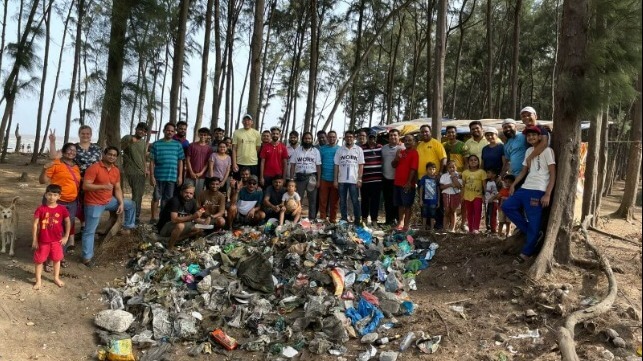Eyesea Supports Indian Clean-Up and Mapping Initiative

[By: Eyesea]
Eyesea has announced a pollution clean-up and mapping partnership with the Luna Story Foundation in the Vasai area, north of Mumbai, India. The Luna Story Foundation helped test the Eyesea App in early 2021, and the data collected in this phase showed how the app could be used by clean-up groups to record their work and demonstrate the scale of local pollution.
Following a six-month project trial, Eyesea agreed to seek further support for Luna Story through its membership. NSB Group, Isle of Man Ship Registry, MPC Container Ships, GAC India, and GAC Bunker Fuels all agreed to provide further support to Eyesea for an expanded 12-month clean-up campaign and a regional pollution survey.
Eyesea founder, Graeme Somerville-Ryan said “India plays such an important role in shipping, and it is great to be able to support coastal clean-up work here. The local data we have collected shows us there is an urgent need to act on ocean impact pollution. This data allows us to have look closely at what our measurable impact vs. spend is going to be. Luna is removing pollution at a cost of around 5-10 cents per kilo, which I think is at the ‘effective’ end of the scale.”
Early-stage work has resulted in 2,000kgs of ocean impact pollution being removed over six clean-up sessions and approximately 8,000 data points recorded through the Eyesea App over 21 days.
Isabella Efstathiou, Eyesea’s Project Manager, said “This project is a great example of how Eyesea can package effective ESG projects for our members, and is developing capacity to close the loop—mapping pollution, creating a dataset, providing this data to people and companies that want to support action in the most cost-effective way possible. It is important we get a concrete number on what it takes to remove ocean impact pollution because we are dealing with finite budgets and limited time. We must focus work where we are going to be most effective.”
Eyesea aims to combine the reach and resources of the maritime industry to geolocate pollution, analyzing this data, and connecting it with effective action. Only with the help of members, donors, and volunteers can this be achieved.
“With the recent UN Ocean Conference covering critical issues of policy, planning, and regulation, it’s good timing to show how the Eyesea network can collect pollution data and effectively support the removal of ocean impact pollution—different sides of the same equation” said Somerville-Ryan.
The products and services herein described in this press release are not endorsed by The Maritime Executive.

